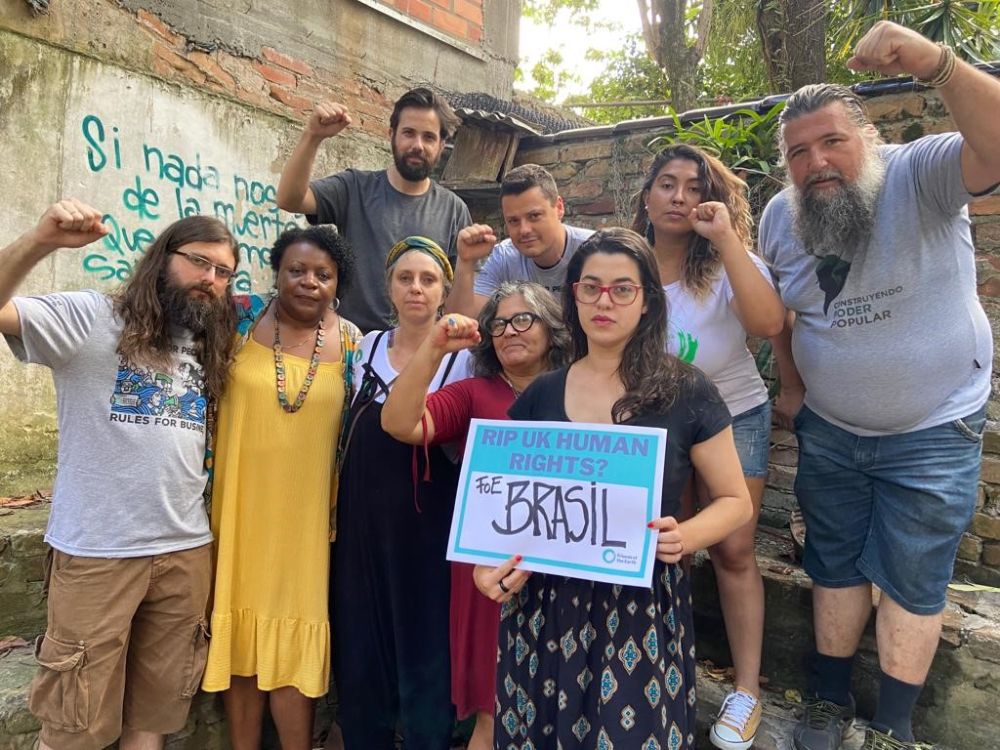
Friends of the Earth England, Wales and Northern Ireland is part of Friends of the Earth International – the world’s largest grassroots environmental federation, uniting a network of over 70 national member groups and some 5,000 local activist groups across every continent.
With over 2 million members and supporters around the world, we campaign on today’s most urgent environmental and social issues and promote solutions that'll help to create environmentally sustainable and socially just societies.
International solidarity

Egypt
During COP27 in Egypt, we stood with allies to demand the release of Alaa Abd el-Fatah and other prisoners of conscience. So did our groups. We'll continue to stand with anyone who faces oppression, because there's no climate justice without human rights.

Slovenia
In 2022 we took action against the toxic Energy Charter Treaty and in solidarity with Friends of the Earth Slovenia. The treaty allows fossil fuel companies to sue governments for climate- friendly legislation, but 2022 has seen a host of countries leave it.

Palestine
Friends of the Earth continues to stand in solidarity with PENGON (Friends of the Earth Palestine) as people fight for access to their land, resources and human rights. Read more about solidarity with Palestine.

Bangladesh
We took and shared photos of urban trees on social media and called for the destruction to end after 600 trees were felled in Dhaka to rebuild a traffic divider. Following local and international resistance, the felling has now stopped and the remaining trees are being protected. Major tree planting has also started in the north of the city.

Malaysia
Indigenous communities in Sarawak, Malaysian Borneo, have been fighting logging on their native lands for years. Instead of listening to their pleas, timber giant Samling slapped them with a defamation lawsuit for 5 million ringgit (£870,000). We joined 160 organisations across the globe in calling for Samling to drop its lawsuit against SAVE Rivers, which it finally did just hours before the court case was due to begin.

Brazil
Throughout 2021/22 we stood with indigenous peoples in Brazil. We supported opposition to a Supreme Court case that’d deny historic land rights, and we demanded accountability for attacks against Defenders. The ruling was postponed, and the new Brazilian government plans to deliver much stronger protection for indigenous peoples and the Amazon.

Mozambique
Gas projects in Mozambique's Cabo Delgado are trampling on human rights, contributing to climate breakdown and displacing hundreds of local families. As we took the government to court during 2021/22, our groups took action in solidarity with Justiça Ambiental (Friends of the Earth Mozambique).
Read about why groups think international causes are important.

Our sister organisations supporting us


Solidarity at Friends of the Earth
Solidarity means standing and acting together. We do it when we have a common cause that links us to the people on the other side of the street, or on the other side of the world. Home, dignity, justice, community, our will to work for one another – although the world is complex, we believe fundamental values such as these unite the vast majority of us. So when we see these things under threat from those who hold power, or have an opportunity to work together to change our world for the better, we respond by taking solidarity action.
To be a part of Friends of the Earth means being part of a family of over 70 organisations around the world. When we act in solidarity, we feel not only part of that family but also of something even bigger – a global community working for justice and for the living world. When we act in solidarity, we remember hope, our common bonds, and that there’s no greater strength than togetherness.
Read more about why solidarity matters.



